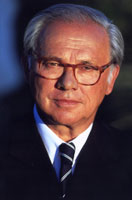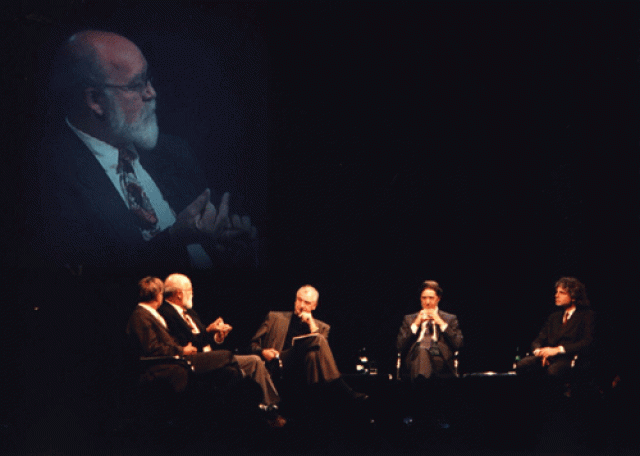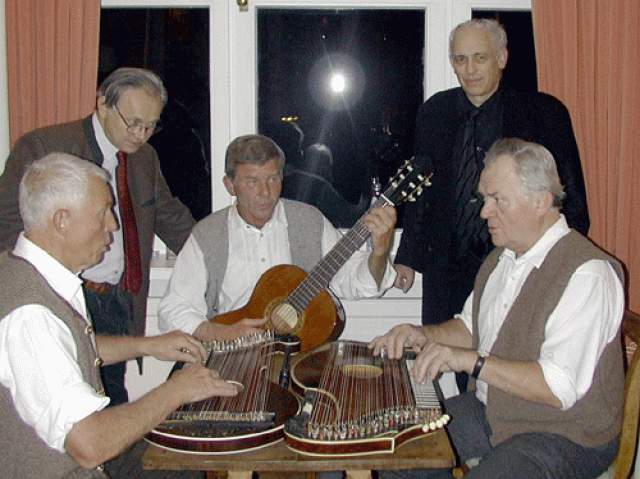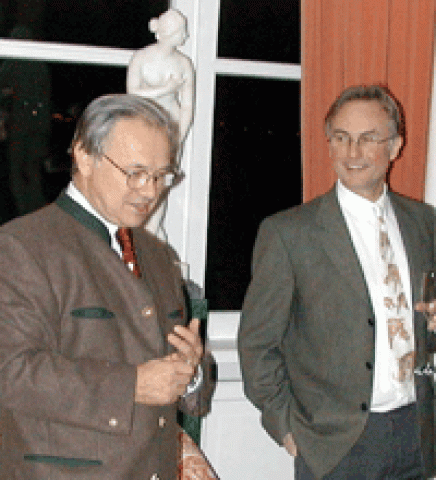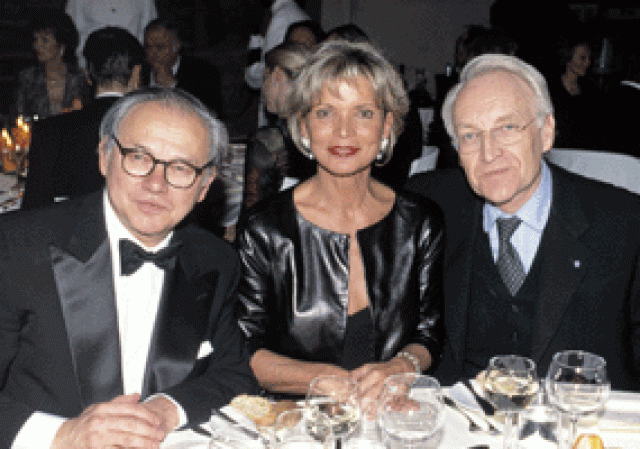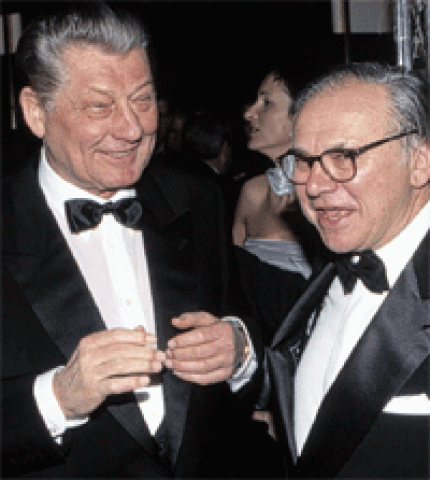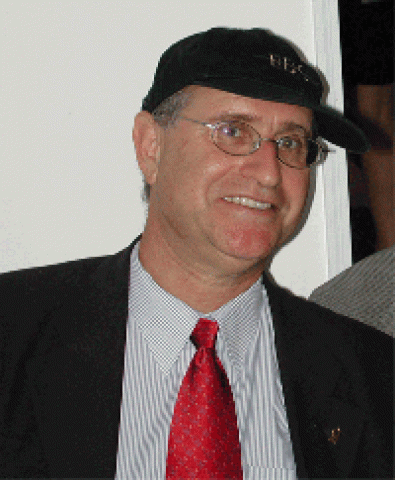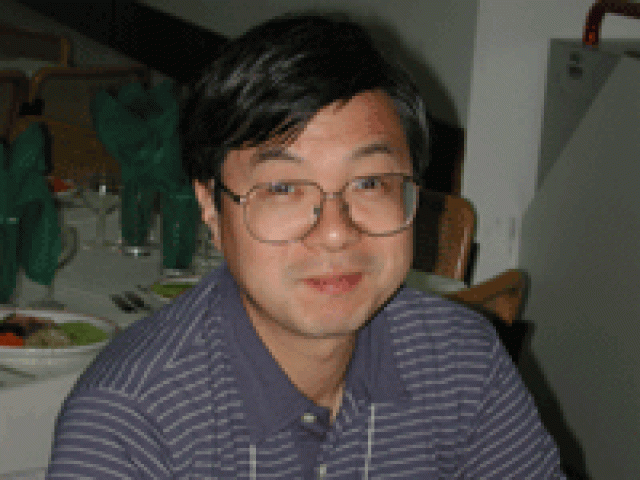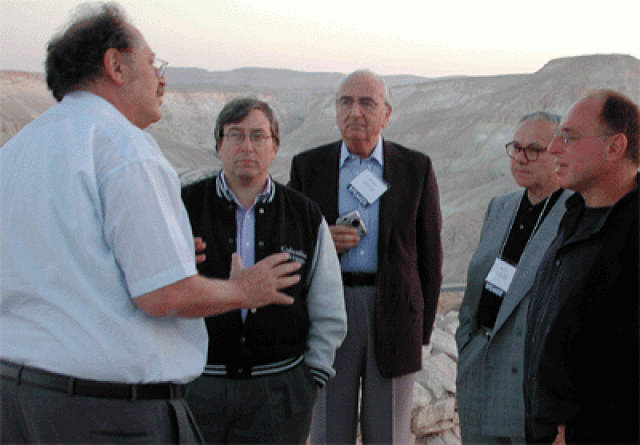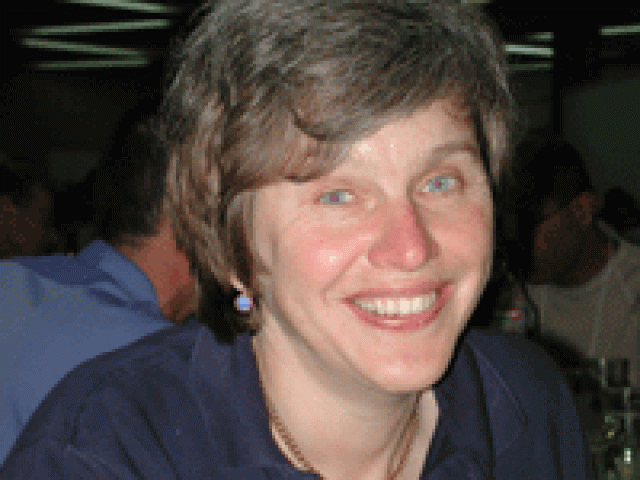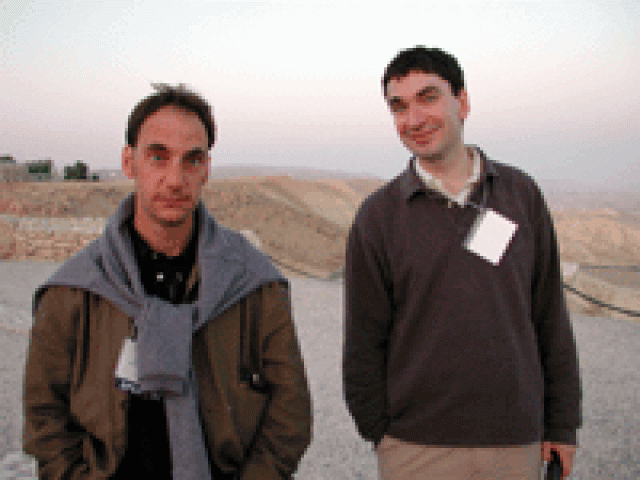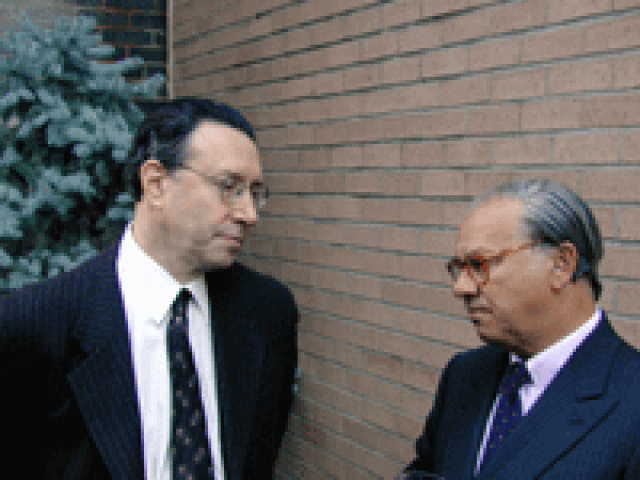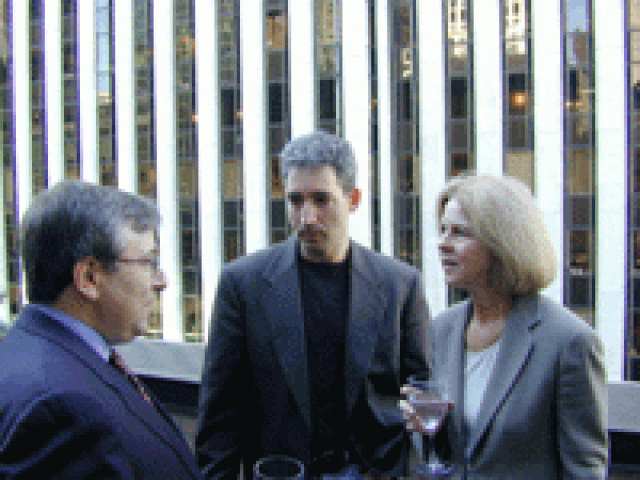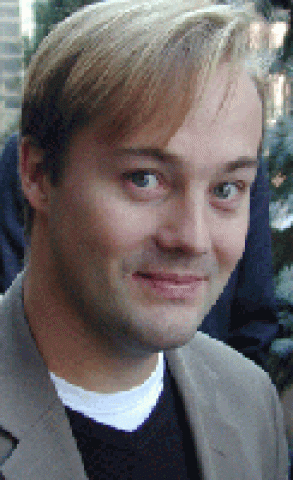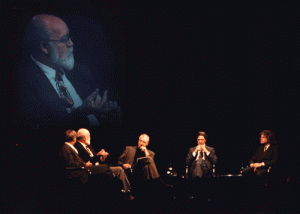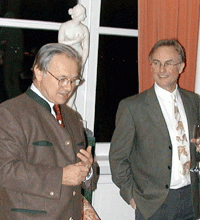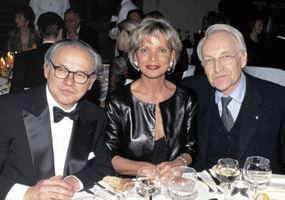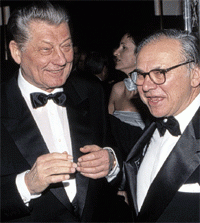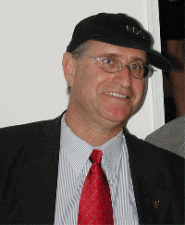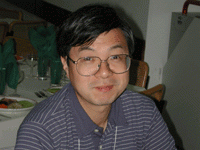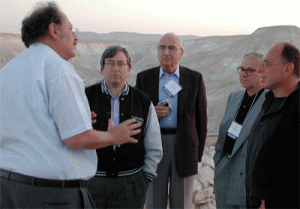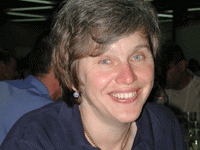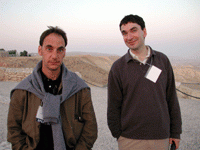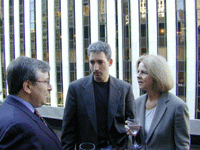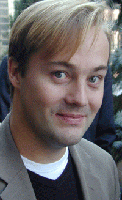HUBERT BURDA: GERMANY'S AGENT OF CHANGE
Cannes, January, 1995. I walk across the beach to meet Hubert Burda for lunch. Burda, publisher of Focus Magazine and the co-founder, with Pearson in the UK and Hachette in France of Europe Online, which is already up and running, is at the MILIA conference to deliver the keynote address, introduced by Lord Weidenfeld, Chairman of Burda's New World Vision. I find him and his ever-present entourage at an outdoor restaurant. He is seated next to a tall, beautiful young woman, Jane Metcalfe, New Media entrepreneur who is cofounder of Wired Magazine — Burda is an investor in HotWired, the magazine's online venture. Around them a group of young men, his aides, all wearing dark suits and sunglasses (a la Men in Black) talk on cell phones. A surreal scene? Yes. But as I am to find out over time, it is pure Burda.
Although we are meeting to talk business, the discussion quickly turns to art, to stories about thepainters Warhol, Rauschenberg, Miro, the conceptual artists Joseph Beuys and James Lee Byars. Burda, I quickly find out, is not your typical media mogul. He is in constant search for great ideas, an agent of change, an applied philosopher. His wide areas of interest include the, arts, media, technology, social issues, international issues, and a personal agenda that leads him to actively support many interesting and enriching endeavors.
The Bavarian Alps. November 1998. I am in Munich to attend "The Digital Planet" an event featuring presentations by four of the world's leading scientists and third culture intellectuals: evolutionary biologist Richard Dawkins, philosopher and cognitive scientist Daniel C. Dennett, biologist Jarsed Diamond, and psychologist Steven Pinker. Novelist Douglas Adams is the master of ceremonies. The event is being held at the Muffathalle Theatre, a venue where rock concerts are staged. The organizer of the event, Christophe Reisner, is not from the German Ministry of Culture: he's a former drummer in a rock and roll band.
The scene in the lobby at the Vier Jahreszeiten reminds me of the press room during a presidential election in the US. Reporters are everywhere interviewing the stars of the evening as are television crews from all over Germany and Europe. The thousand seat hall is sold out and several hundred people are standing outside in the freezing rain under umbrellas hoping get in. The youthful audience includes many young editors from German book publishers who have flown in from Frankfurt, Berlin, Hamburg.
Sitting up front is a group of people from Burda's enterprises led by Christa Maar, director of the Academy of the Third Millennium, a Burda-sponsored foundation, which over the past several years has organized a number of notable world-class events in Munich, including bi-annual meetings concerning the neurosciences, software interface and design as applied to envisioning knowledge, and the Internet and politics. Maar goes backstage later and extends to the speakers an invitation to dinner in their honor the following evening at Burda's chalet in the nearby Bavarian Alps.
At the sumptuous sit-down dinner, Dr. Burda and his guests have an opportunity talk to and question three of the third culture superstars who were able to attend. It's not every night that you can question Richard Dawkins about his Darwinian view of culture, exemplified in his invention of the "meme," the unit of cultural inheritance, which though essentially idea, is operated on by natural selection; or talk to Daniel C. Dennett about his theories concerning the computational model of the mind; or learn from Steve Pinker how he has merged Chomskyan ideas about an innate language faculty with the Darwinian theory of adaptation and natural selection. All through dinner Burda, the ever-gracious host, is listening, and thinking. Learning and connecting. And at the table, in addition to the assorted Bavarian celebrities, are his database company guy, the head of his Internet group, and Maar, the director of his foundation. He never stops.
I talk with one of the dinner guests about the previous evening remarking on how the young German crowd seemed so open to new ideas. "Yes," she replies, "but the problem with German culture today is that our bright young men wake up one morning, and, suddenly, they are old." "Not Hubert," I reply, "he's the youngest guy in Germany."
Residence of The Bavarian Kings. Munich, February, 2000. Munich again, this time for Burda's 60th birthday party held at the flamboyant Residence of The Bavarian Kings. The scene is resplendent in old world style and elegance. I stroll through the King's bedroom along with the cream of German society to the magnificent ballroom. The guests are a "who's who" of the leaders of German media, government, and manufacturing. Seated at Burda's table are Leo Kirch (Germany's most influential media tycoon), Prinz Franz (the legal heir of the throne of the Bavarian kings (if there ever was such thing as a Bavarian kingdom), Edmund Stoiber, Minister President of the State of Bavaria; and Jürgen Schrempp (chairman of DaimlerChrysler). This is powerful Germany. A group responsible for Germany's great postwar success, they are the most structured people in Germany, disciplined, temperamentally conservative. Although Burda is very much part of this establishment group, a charter member of Powerful Germany, he is also a man who works the edges of the future.
He is aware that the business and cultural models of Germany's postwar success are not viable anymore. The world has moved to software and computation and the Germans are hardware people. German industrial giants, the media conglomerates, are like huge oil tankers limited in their responses to changing times by sheer size and momentum. Their cultural exoskeletons inhibit adaptation to the new third culture, the third culture, in which the biggest change is the rate of change.
Burda recognizes that everybody's business today is software, that, in the words of Stanford AI expert Edward A. Feigenbaum, "it's a software-first world." Software is reshaping civilization and that is the big story in intellectual life today. "It's the beginning of everything," says Yale computer scientist David Gelernter. To stay competitive in the new global order, Germany needs to reinvent itself. In addition to the disciplined people who were behind the postwar economic boom, it needs create a base for entrepreneurial movement, to allow for the nonconventional human spirit.
Burda has the discipline of Germany but he also has certain qualities that Powerful Germany may not have respected in the past. He is stirring the pot, bringing people together, searching for new ideas, making things happen. When he meets talented people he brings them into his network, combines them into his mix. This is his discipline. This is his power. In addition to new people, he attracts new ideas, brings fruitful chaos to a world of certainty, shakes things up, and makes a mess out of the old order, the old way of thinking. Science (and the technology that follows) does not have to be beautiful or pure. Things do not need to be symmetrical or deducible from first principles. That esthetic, a great motivating force in science since Plato, is over. The sciences of complexity, which are the hallmark of the third culture, can be very messy. Out of chaos comes creativity. Hubert Burda is Germany's agent of change.
In 1993, Burda, synthesizing his experience as an art historian and a connoisseur of fine arts with his understanding of New Media, recognized that the use of digital imaging technology changed the ratio of costs between photography and print in magazine publishing from 5-1 to 1-1. Armed with "Burda's Algorithm" he moved to quickly establish Focus Magazine, one of the great German economic success stories of the 1990s (5.8 million readers today). By 1995 he had already established Europe Online and Focus Online which were up and running at a time when modem use in Germany was still severely curtailed by government regulation and telecom costs were prohibitive. His early investment in Wired Magazine, the leading arbiter of the digital revolution at that time, gave him a front row seat to the third culture revolution. Today Hubert Burda Media is the biggest provider of German language Internet content, which includes the #1 and #2 Websites in the German language: Focus Digital and Tomorrow. Recent Burda initiatives include a number of technologically innovative wholly-owned Internet startups including TalkingWeb and Cyberlab as well as investments in Now, Ciao, Onvista and numerous other Internet ventures in the US and in Germany.
HUBERT BURDA: GERMANY'S AGENT OF CHANGE
Jerusalem. May, 2000. I arrive in Jerusalem at Burda's invitation for "Cool People in the Hot Desert", the first conference convened by the Hubert Burda Center for Innovative Communication at Ben Gurion University in the Negev. The Center's mandate is to enable and enhance a European-Israeli as well as an international New Media and High Tech dialogue and exchange. It is interesting to note that after Silicon Valley and Silicon Alley (New York City), greater Israel and Bavaria rank #3 and #4 respectively in the number of startup companies. Burda understands this.
"Cool People in the Hot Desert" creates a context and a bridge ("Israeli-German Start Up Forum") whereby the leaders of German and Israeli Internet startup companies can meet, and begin to work together, present themselves to the conference's international audience, obtain new contacts and exchange ideas. Co-hosting the conference with Burda are Avishay Braverman, President of Ben Gurion University and former Chief Economist of the World Bank and Joseph ("Yossi") Vardi, Founder of Mirabilis/ICQ and international investor. Forty young German Internet executives arrived in Jerusalem to be greeted by their Israeli counterparts and hear the opening address by former Israeli Prime Minister Shimon Peres before departing the next morning for the Negev.
According to Yossi Vardi, "the conference allows the participants to get to know the coming markets where the new fields of applied technologies create the basis for prosperous cooperation and achievements between individuals and countries." "Our vision, which Burda shares," notes Avishay Braverman, "is to create, in this desert, a center for hi-tech, bio-tech, nano-tech and future-tech that will lead the poorer people who live in this region into opportunities for advancement, that will lead the nation of Israel into a more wide-spread development of the vast natural resource of the Negev, which makes up 60% of the land mass, and of course to enable a true Middle-Eastern center for the most advanced in high-tech and communications technologies."
The Negev, May 2000. Dinner is at an ancient outdoor Bedouin encampment. Burda's personal guests at the long tables overflowing with Bedouin food, wine, hookahs, are an international community of mover and shakers of .... ideas.
They include Martin Peretz, American publisher (New Republic), Harvard Professor, and Al Gore's long-time mentor and advisor; Software and Internet entrepreneur Jean-Paul Schmetz, a Belgian educated in America who runs Burda's Internet companies; Gregory Blatt, a Canadian, Director, World Economic Forum at Davos, and now on Burda's staff; Izumi Aizu, the Internet advisor to Japan's "Keidenren", the informal group of the heads of the major information companies; Jordanian venture capitalist Omar Saleh, prime mover of that country's Internet endeavors; Lord Young of Graffham, a member of Margaret Thatcher's cabinet who privatized British Telecom, Cable & Wireless, and British Aerospace; Sandy Climan, former Hollywood agent and partner of CAA, and now a venture capitalist at Entertainment Media Ventures.
The Ethiopian Children's Choir is performing on the outdoor stage under the dessert night sky. Burda, Vardi, and Braverman, don Bedouin clothing, and begin to lead the guests in dancing under the desert night sky.
"What struck me most." Jean-Paul Schmetz said later, "is the fact that we were discussing building a new economy from scratch (all start-ups are starting from nothing) in a place where someone (Avishay Braverman) is talking about building a huge city/economy in the desert. Somehow, the scope of what we are doing became more tangible if you look at an empty desert and imagine that sometime in the future this will be a huge metropolis."
"The week in the desert was priceless," says Sandy Climan looking back. "We touched on much more than the state of technology and the (sorry) state of the financial markets. It was a time of reflection in a distant land which allowed the soul to couple with the mind in trying to grasp clarity of the future. To the credit of the conference, social ramifications of technology and very human issues were balanced against the world of technology-driven business opportunities. We talked about all the good that technology could bring to building infrastructure and a better life for those striving to succeed in developing nations. And we talked about peace... Dancing with Dr. Burda and the others in the moonlight of a barren Negev desert to the beautiful voices of young Ethiopian immigrants is a nurturing evening never to be forgotten. These are rare moments."
The conference has ended. I am seated next to Burda discussing German literature on the bus as it leaves the Negev to return to Jerusalem. A briefcase has been left behind at the hotel by one of his staff. The bus, and the two trailing cars stop in the middle of the desert highway. Two camels look on with curiosity. Burda is late for an appointment in Jerusalem with Teddy Kolleck, the legendary former mayor. The bus, the two cars make a U-turn to head back to the hotel as no less than six assistants, 4 on the bus and 2 in the cars, talk to each other on cell phones, attempting to locate the missing item.
"Ahh, chaos. This is chaos", sighs Burda in resignation. He will miss his appointment with Kolleck. "No, Hubert", I reply, "You are chaos!"
New York. August 2000. Burda is in town on an August Sunday and I come back early from my farm to the deserted city to meet him for dinner and introduce him to Jason Calacanis, the 28 year old publisher and editor of Silicon Alley Reporter and Digital Coast Reporter. Calacanis, a cutting-edge guy has wheeled and dealed himself into national prominence, having already been profiled by The New Yorker and Wired among other publications. Dinner is at a restaurant just one block from Burda's hotel, yet the arrangements have required an exchange of a dozen emails with his staff, the last three of which have concerned the advisability of having a limousine on hand to transport Burda the one block from the hotel to the restaurant.
Calacanis and I meet Burda at the hotel and we venture forth on the warm summer evening. Burda is alone. No entourage. No Men in Black. It's a first.
"So, Jason" he says to Calacanis as we stroll down Madison Avenue, "you come to Munich in September and I will have Schmetz introduce you to all the Bavarian software companies and we do a Bavarian Alps magazine and then we get Vardi and Braverman to bring together all the Israelis we met in the Negev and we do a Silicon Wadi publication and tie the two together and then connect Israelis and the Germans to your New York and Hollywood people....."
Calacanis, taking it all in, says, "By the way, I'm going to Ireland next week as a guest of the Irish government"
"Wonderful," exclaims Burda, "there is a lot of software business in Ireland. We can bring them in too. And did I mention to you, "he goes one, "that we go to Jordan with the Israelis in February for the next "Cool People" conference. King Abdullah wants to make Amman an Internet and technology center. I must introduce you to Omar Saleh......"
We stop mid-block in front of an art gallery window displaying sculptures from ancient Persia. "The owner," Burda says as he admires the statues, "is a friend of mine. Just look, examine the quality which is very good for the period."
We have arrived at the restaurant for dinner where we continue talking about Persian sculpture, the New York art scene, the Nam June Paik retrospective at the Guggenheim Museum. Before I know it, dinner is over, we say good night, and Burda is off to rejoin his family for a 3-week vacation in Corsica where he will sit by the sea and paint.
Eastover Farm, Connecticut, August 2000 I am sitting outdoors at my farm in rural Connecticut on a cool, breezy summer day. The horses are feeding, the cows are quiet. I am watching the corn grow in the nearby field.
Germany cannot regain its status as a dominant cultural power without embracing a new kind of cultural discourse. It cannot sustain its economic position unless it radically reboots itself into the world the new world of computation, software, the Internet. Germans cannot sit by complacently and allow a situation in which all the serious thinking about the critical questions facing the world today is done for them. If Germany is once again to become once again the center for Europe, Burda is the man who will lead that transformation.
Burda, the connector of ideas, people, and places is attempting to marry German discipline to the entrepreneurial spirit in new kinds of relationships. New York, Tokyo, LA, Toronto Israel, Jordan, United Kingdom, and the rest of Europe. He does so partly for humanitarian reasons and partly for the benefits which will come from connecting disciplined people with the bubbling, enthusiastic, and messy and chaotic startup culture places like the US and Israel.
Burda, the visionary. "Let's create relationships between Germany and Israel and bring other entrepreneurs together into the mix. Let's see to it that there is also an infusion of this new culture in Germany. Let's create new structures in which the intellectual part, business part, the humanitarian part all work together."
Burda is a man of the third culture. He is Germany's agent of change.

Evolutionary biologist Richard Dawkins, philosopher Daniel C. Dennett, novelist Douglas Adams, biologist Jared Diamond, psychologist Steven Pinker [photo David Steets, in Der Spiegel]

Hubert Burda, JB, Bavarian yodelers

Hubert Burda, Richard Dawkins
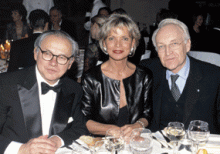
Hubert Burda, film star Uschi Glas, Minister President of the State of Bavaria Edmund Stoiber

Media tycoon Leo Kirch, Hubert Burda

Ben Gurion University President Avishay Braverman

Asia's "Mr. Internet" Izumi Aizu
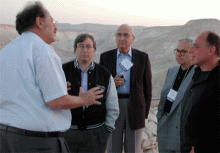
Internet entrepreneur Joseph Vardi, Entertainment Media Venture's Sandy Climan, former British government minister Lord Young, Hubert Burda, The New Republic's Martin Peretz

Burda Media's Steffy Czerny

Burda Digital's Gregory Blatt, Jean Paul Schmetz

Time Warner's Norman Pearstine, Hubert Burda
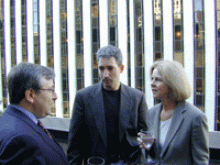
Sandy Climan, physicist Brian Greene, religious historian Elaine Pagels

Silicon Alley Reporter publisher Jason McCabe Calacanis

